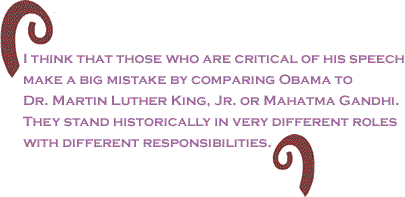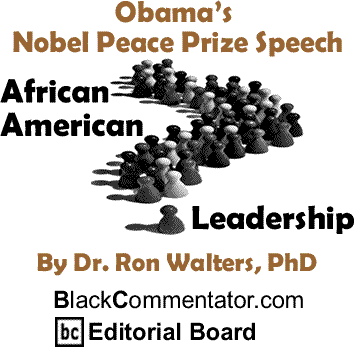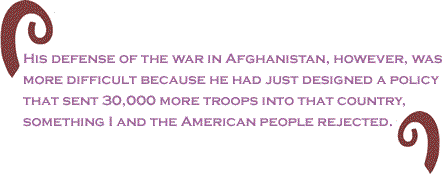
|
||||||||||||||||||||||
|
||||
 |
||||
| As one of the first to defend President�s Obama�s selection for the Nobel Peace Prize, I also believe that his speech was much more than an adequate expression of the contradictions in which he found himself by being selected. The first contradiction was created by the fact that Obama was selected by the Nobel Committee essentially because he presented to the world a new vision of American leadership in the global arena that rejected the failed policies of George Bush and that pointed the way to resuming collaboration with its allies for productive purposes.�� Some of those purposes were elaborated even after he had been selected, in speeches in Europe, Egypt and the Caribbean that contained new elements of American policy such as: the restoration of diplomacy as the lead action and not militarism as a vital aspect of resolving crises, the total elimination of nuclear weapons, resuming the Middle East peace negotiations, seeking the normalization of relations with Cuba, proposing a new green global economy, and the like. Obama, however, used his Nobel speech to answer the contradiction of being selected as a sitting Head of State who inherited two wars � something the Nobel Committee already knew when they selected him.�� Given his situation, he suggested that �the instruments of war do have a role in preserving the peace,� as in World War II, or in the establishment of a new order of human rights as in the Civil War.��
I think that those who are critical of his speech make a big mistake by comparing Obama to Dr. Martin Luther King, Jr. or Mahatma Gandhi.� They stand historically in very different roles with different responsibilities.� The current wars have been justified by President Obama as �necessary� in seeking retribution for the killing of 3,000 people on American soil.�� That creates a contradiction between the responsibilities of statecraft for retribution and the pursuit of nonviolence as a strategy to resolve problems.�
Obama used the concept of the �just war� to discuss this.� Peace with justice must be seen to be within the objectives of the Nobel Committee, even given the methodology of force that is used.� I remember that when the African National Congress in South Africa was called up before the Truth and Reconciliation Commission to justify its guerilla war actions against whites, they said they were conducting a �just war.�� War as the only instrument left to them to regain standing in their Country by an oppressive the White minority regime, so it was an instrument they believed they would eventually lead to a just peace � and the society has since moved substantially in that direction.� I believe that President Obama has, again, risen to the mark to make the best of a set of contradictory situations and that this Prize and his speech may serve as guideposts for his administration to truly seek justice in both international and domestic affairs. BlackCommentator.com Editorial
Board member, Dr. Ron Walters, is the Distinguished Leadership Scholar,
Director of the African American Leadership Center and Professor
of Government and Politics at the University of Maryland College
Park. His latest book is: The Price of Racial Reconciliation (The Politics of Race and Ethnicity)
|
||||
 |
||||
If you would like to comment on this article, please do so below. There is a 400 character limit. You do not need a FaceBook account. Your comment will be posted here on BC instantly. Thanks. Entering your email address is not mandatory. You may also choose to enter only your first name and your location.
|
||||
Thank you very much for your readership. |
||||
| Any BlackCommentator.com article may be re-printed so long as it is re-printed in its entirety and full credit given to the author and www.BlackCommentator.com. If the re-print is on the Internet we additionally request a link back to the original piece on our Website. | ||||
| |
||||
| December
17 , 2009 Issue 355 |
| Executive Editor: Bill Fletcher, Jr. |
| Managing Editor: Nancy Littlefield |
| Publisher: Peter Gamble |
| Est. April 5, 2002 |
| Printer Friendly Version in resizeable plain text format |
 |
 |

|
 |
| |
| |














































